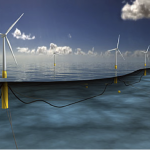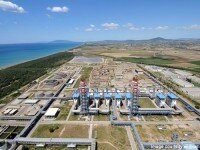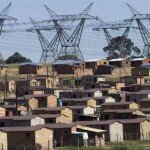Posted in Comment, Repowering communities on 08/10/2010 10:57 am by Stephen Tindale
The UK Energy and Climate Secretary has announced that, from 18 August 2010, local councils will be allowed to sell renewable electricity. This is fast and impressive work.
read more »
Posted in Comment on 11/10/2011 05:01 pm by
Robert Webb comments on the strengths and weaknesses of the ‘Energy Internet’ vision.
read more »
Posted in Comment on 12/11/2012 11:02 am by Stephen Tindale
CER has now published my short policy brief ‘How to expand renewable energy after 2020′.
read more »
Posted in Comment on 01/11/2010 10:54 am by Stephen Tindale
The UK has enormous wind potential, and is already the world leader in terms of installed offshore capacity. However, it achieved this with only 688Mw of operational offshore wind farms.
read more »
Posted in Comment on 08/12/2014 03:02 pm by Stephen Tindale
You can read my article here for the Fabian Society on a speech by the Shadow Environment Secretary, Maria Eagle, about climate change.
read more »
Posted in Climate Answers' projects, Comment on 03/12/2010 11:28 am by Stephen Tindale
This week, another dispute has broken out between environmentalists in the UK, this time primarily between journalist and author, George Monbiot, and the head of the company, Solar Century, Jeremy Leggett, over whether it is sensible to offer householders in the UK large subsidies to install solar photovoltaic (PV) panels.
read more »
Posted in Comment on 10/12/2010 02:07 pm by Stephen Tindale
The South African government has published an energy plan which proposes a decline in the use of coal and six new nuclear power stations. The country is not short of coal, so the government should be commended for exploring alternatives.
read more »
Posted in Comment on 12/13/2013 02:41 pm by Stephen Tindale
Friday the 13th – and reasons to be gloomy about UK energy policy
read more »
Posted in Comment on 05/13/2010 10:23 am by Stephen Tindale
The UK has a new government and the prospects for climate policy are mixed. The promised policies on aviation and coal are stronger than those of the former Labour government. The approach to renewables is similar to that of Labour. However, the approach on nuclear power looks like a recipe for muddle and delay.
read more »
Posted in Comment on 01/14/2010 04:42 pm by Stephen Tindale
Today, I attended a conference organised by Business for a New Europe and the Centre for European Reform on Is the EU good for business?. The general answers was (unsurprisingly, given the organisers) ‘yes, generally, but could be better’.
read more »
Posted in Comment on 03/14/2011 10:23 am by Stephen Tindale
The horrific current events in Japan must make all who favour nuclear power question our support. I have spent much of the weekend doing so, but still believe that nuclear power is a necessary, low-carbon bridge-technology, until the world can be 100% reliant on renewables.
read more »
Posted in Comment on 05/14/2014 11:37 am by Stephen Tindale
Swiss paper Le Temps has now published (in French) my article on the need for a new narrative for European integration. Here is the English version.
read more »
Posted in Comment on 05/14/2014 11:47 am by Stephen Tindale
The Economist has published my short article on why we need energy efficiency plus all clean energy sources: renewables, carbon capture and storage and nuclear.
read more »
Posted in Comment on 07/15/2016 09:01 am by Stephen Tindale
The UK no longer has a department with the words ‘climate change’ in its title. Climate policy is now the responsibility of a new Department of Business, Energy and Industrial Strategy. This could be seen as a downgrading of climate action – and has been condemned by some green groups. But I think it is […]
read more »
Posted in Comment on 09/15/2011 02:07 pm by Stephen Tindale
Is gas sufficiently low-carbon to be an adequate bridge technology? No – it’s emissions for every unit of electricity produced are over three times as high as emissions from nuclear power.
read more »
Posted in Comment on 01/16/2012 12:41 pm by Stephen Tindale
Global investment in renewables and energy efficiency increased 5% to $260 billion in 2011, according to Bloomberg New Energy Finance.
read more »
Posted in Comment on 06/16/2009 12:03 pm by Stephen Tindale
On Saturday, I was on a panel at the World Science Festival in New York, with James Hansen of NASA and three others. Hansen’s position on nuclear can be summarised simply: it’s better than coal.
read more »
Posted in Comment on 03/16/2010 02:25 pm by Stephen Tindale
This month, the US Department of Energy has announced a Sustainable Energy Resources for Consumers (SERC) programme. This will offer grants totalling up to $109 million.
read more »
Posted in Comment on 07/17/2009 07:33 pm by Stephen Tindale
On Wednesday 15 July 2009, the UK government published its plan to make the UK a low carbon economy. It is good on electricity, quite good on energy efficiency and heat, but bad on transport.
read more »
- Tags: carbon capture, carbon tax, CCS, CHP, climate change levy, coal power, decarbonisation, energy efficiency, fuel poverty, nuclear power, renewables, statistics, wind power
Posted in Comment on 04/18/2010 03:04 pm by Stephen Tindale
The manifestos of the three main UK political parties, Conservative, Labour and Liberal Democrat, all agree that climate change is an extremely serious issue and that tackling it can be done in ways which enhance energy security and strengthen the UK economy.
read more »
Posted in Comment on 02/18/2010 09:41 pm by Stephen Tindale
In November 2009, 3% of OECD electricity was generated by renewables other than hydro. 14% came from hydro. And this was only 17% of what electricity was then used, not total energy used.
read more »
Posted in Comment on 01/18/2010 07:08 pm by Stephen Tindale
President Obama has done more to control climate change than President Bush ever did. However, that is hardly setting the bar very high.
read more »
Posted in Comment on 01/18/2017 08:45 am by Stephen Tindale
Last week the former energy minister Charles Hendry published his review on tidal lagoons (https://hendryreview.wordpress.com/) I am a consultant to Tidal Lagoon Power (TLP), so not disinterested. But I think that anyone reading the report will recognise it as an extensive, evidence-based and therefore serious review. Hendry was in my view a good energy minister […]
read more »
Posted in Comment on 06/18/2009 09:36 am by Stephen Tindale
Today, EU national governments are meeting to discuss who should be the next President of the Commission. The current president, Jose Manuel Barroso, wants a second term and will probably be given it. This would be good for the climate.
read more »
Posted in Comment on 03/19/2010 01:39 pm by Stephen Tindale
This month has seen two significant developments in plans to harness the power of the waves and the tides off the British Isles. On 2 March 2010, the Regional Development Agency for the South West of England announced the start of the construction of an onshore electricity sub-station at Hayle in Cornwall, so that power from its Wave Hub – a facility to test wave technology ten miles off the Cornish coast – can be fed into the electricity grid. And this week, the Crown Estate, the body that administers over half of the UK’s foreshore and all the seabed out to 12 miles, announced the successful bidders in the world’s first commercial wave and tidal leasing round, for ten sites in Scotland’s Pentland Firth and Orkney waters.
read more »
Posted in Comment on 04/20/2010 06:51 pm by Stephen Tindale
The Saudi Arabian government has announced that it will pursue nuclear and renewable electricity to meet the country’s rising demand for energy, driven by a rapidly expanding population and industrial base, and a growing need for desalinated water. It is not unusual for a government to announce support for nuclear or renewables, but it is quite striking for the country with the world’s largest known oil reserves, and the fifth largest gas reserves, to be planning to develop alternatives to fossil fuels.
read more »
Posted in Comment on 11/20/2009 11:22 am by Stephen Tindale
This week, I have been to Brussels for meetings on energy efficiency, renewables, nuclear and CCS. The now-ratified Lisbon Treaty says that there will, in the future, be a common energy policy, but this is unlikely to have much practical impact, but the EU has achieved much in important areas.
read more »
Posted in Comment on 09/20/2009 04:41 pm by Stephen Tindale
On Thursday, I launched a report I wrote for the Centre for European Reform on how the EU should meet its 2020 target that 20% of all energy should be from renewable sources. Meeting the target would help control climate change, greatly increase EU energy security and create many new jobs and industries.
read more »
Posted in Comment on 05/06/2015 10:08 pm by Suzanna Hinson
Analyses what the parties standing UK-wide are promising to do about climate change.
read more »
Posted in Comment, Policy on 06/24/2015 09:03 am by Stephen Tindale
Key quotes from, and a few of my comments on, the excellent Lancet Commission report
read more »
- Tags: 'cap-and-trade', carbon tax, CCS, coal power, decarbonisation, energy efficiency, EU, nuclear power, Public health, renewables, solar power, wind power
Posted in Comment on 06/10/2016 07:28 am by Stephen Tindale
In less than two weeks’ time, the UK will vote on whether to stay in or leave the EU. I am doing all I can for the Stronger In campaign (https://www.strongerin.co.uk/#QkGoYymoqlkpWtIE.97). Opinion polls predict a very close result. Being Labour, I never believe opinion polls. Britain could well vote to leave. But I’m also an […]
read more »
Posted in Comment on 01/22/2010 07:43 pm by Stephen Tindale
This week, the European Union and Iraq signed an agreement to strengthen their energy cooperation in areas such as natural gas, energy security and renewables.
read more »
Posted in Comment on 01/22/2014 02:55 pm by Stephen Tindale
Today, the European Commission published its proposals for a 2030 climate and energy framework. The targets are not ambitious, but policy makers should now focus on measures rather than numbers.
read more »
Posted in Comment, Policy on 02/23/2012 04:58 pm by Stephen Tindale
President Obama has again asked the US Congress to agree a budget which cuts the more than $40 billion in tax breaks for oil, gas and coal producers over the next decade. The president’s budget proposals are sensible and should be passed by Congress. But they won’t be. The left-right divide on climate in US politics is unnecessary.
read more »
Posted in Comment on 10/23/2009 06:46 pm by Stephen Tindale
On Thursday 22 and Friday 23, I went to Clingendael, the Netherlands Institute for International Relations, for a seminar on how to meet the EU 20% renewables target. It certainly felt ironic for an Englishman to be invited to go and tell the Dutch what to do about renewable energy.
read more »
Posted in Comment on 02/24/2011 07:34 am by Stephen Tindale
The European Investment Bank increased its lending to projects to help control climate change to €19bn in 2010. This was a 19% increase over the 2009 figure and meant that climate projects accounted for almost a third of total EIB lending.
read more »
Posted in Comment, Policy on 02/24/2014 08:05 am by Stephen Tindale
The Conservative Party is planning new subsidies for coal power stations. This is a striking historic reversal, because the Tories have traditionally been anti-coal.
read more »
Posted in Comment on 01/24/2011 02:28 pm by Stephen Tindale
A Greek utility is planning to build a 200Mw solar photovoltaic farm. This is welcome news, though only a faltering first step.
read more »
Posted in Comment on 05/25/2012 04:56 pm by Stephen Tindale
David Buchan has written a valuable paper on European electricity policy, in which he argues convincingly that harmonising the various national schemes would be more efficienct and so cut costs. The level of subsidy could continue to differ, but the design of the schemes should be made more consistent.
read more »
Posted in Comment on 08/26/2014 11:29 am by Stephen Tindale
Energy Post has now published my article on why and how the EU should start to use its tidal resources for energy. This would have major climate, energy security and economic benefits.
read more »
Posted in Comment on 10/26/2014 09:47 am by Stephen Tindale
My article for ‘Responding to Climate Change’ on European governments’ acceptance of Commission proposals for a 2030 climate and energy package.
read more »
Posted in Comment on 04/27/2009 01:09 pm by Stephen Tindale
At a time when all the talk is of the need for massive cuts in expenditure, in the Budget on 22 April 2009, the UK Government managed to find some extra money to help control climate change.
read more »
Posted in Comment on 12/27/2011 02:17 pm by Stephen Tindale
The European Commission should focus on proposing specific policies, rather than modelling different scenarios. It has done well with its energy efficiency proposal; now it should propose strengthening the ETS and setting a 2030 renewables target.
read more »
Posted in Comment, Repowering communities on 01/27/2011 12:59 pm by Stephen Tindale
The French government has called for tenders for 3Gw of offshore wind off France, and has given a grant to GDF Suez for a district heating network in Paris, which will use renewable heat.
read more »
Posted in Comment on 05/27/2010 11:29 am by Stephen Tindale
The new UK government has now announced its legislative programme for the next 18 months and there is to be another energy bill. This is a good Bill and should be supported. The government has also announced how it will begin to reduce the deficit.
read more »
Posted in Comment on 09/27/2010 01:38 pm by Stephen Tindale
Ed Miliband was a good Energy and Climate Change Secretary, so the UK now has a ‘green’ Prime Minister, ‘green’ Energy Secretary and ‘green’ Leader of the Opposition. Now for some delivery…
read more »
Posted in Comment, Repowering communities on 06/28/2011 12:57 pm by Stephen Tindale
This is a commentary on the UK government’s new microgeneration strategy. It is good that it recognises the need to address non-financial barriers, but lack of strong regulatory framework will not deliver microgeneration or climate protection.
read more »
Posted in Comment on 03/28/2011 07:03 am by Stephen Tindale
Yesterday’s election in the German region Baden-Württemberg, one of Germany’s richest regions, saw Angela Merkel’s CDU lose power after over half a century in office and there can be little doubt that the campaign was heavily influenced by the Japanese nuclear issue.
read more »
Posted in Comment, Technology on 07/29/2011 09:43 am by Stephen Tindale
Comments on Jonathon Porritt’s arguments against nuclear power.
read more »
Posted in Comment on 12/03/2013 11:57 am by Stephen Tindale
UK energy policy is in utter confusion, but is EU policy any better?
read more »
Posted in Comment on 09/29/2009 04:50 pm by Stephen Tindale
Angela Merkel’s victory in Germany’s election was not unexpected. What was less clear was who her coalition partner would be, but we now know that it will be the FDP. This party is liberal, in both economic and social senses. It is also very pro-business and in favour of tax cuts and is now arguing for reductions in subsidies.
read more »
Posted in Comment on 12/03/2009 09:53 am by Stephen Tindale
Yesterday I went to Brussels for a seminar on CCS with Ruud Lubbers, who used to be prime minister of the Netherlands and is now running the Rotterdam Climate Initiative.
read more »
Posted in Comment on 04/30/2010 06:47 am by Stephen Tindale
The Obama Administration has given the go ahead for a 468Mw wind farm in Nantucket Sound, off the coast of Massachusetts. This will be the US’s first offshore wind farm and has been delayed in the planning process for almost a decade.
read more »
Posted in Comment on 12/31/2009 03:35 pm by Stephen Tindale
The lack of substantial progress at Copenhagen, though not unexpected, has left many people close to despondency on climate change. There is now a serious danger that they will lose interest. More worrying is the danger that the media will lose interest, leading to politicians doing likewise.
read more »
Posted in Comment on 01/04/2010 12:54 pm by Stephen Tindale
For the next six months, Spain holds the Presidency of the EU and, from the start of February, there will be a new European Commission. Spain and Germany lead the EU on wind and solar power, so there are good grounds to hope that the new leadership will result in a major speeding up of the low carbon transition.
read more »
Posted in Comment on 03/05/2010 03:03 pm by Stephen Tindale
On Wednesday and Thursday, I attended a conference on renewable energy in Scotland, on the stunningly beautiful island Skye. I talked about how to dispel myths about climate change and renewables.
read more »
Posted in Comment on 11/05/2010 08:17 am by Stephen Tindale
Courts have put injunctions on the Spanish government’s plans to subsidise Spanish coal. This is welcome. Subsidies should go to coal with CCS, and to renewables.
read more »
Posted in Comment on 01/06/2012 12:39 pm by
Philip Lowe, the Director General, Energy in the European Commission, has responded to my criticism of the EU’s Energy Roadmap.
read more »
Posted in Comment on 12/07/2009 02:54 pm by Stephen Tindale
The Copenhagen Climate Summit starts today. Prospects are looking better than they were a few weeks ago and the fact that President Obama has decided to attend the final negotiating session, rather than just for a token visit at the start, is excellent.
read more »
Posted in Comment, Policy on 12/07/2015 09:30 am by Stephen Tindale
The advance represented by Energy and Climate Secretary Amber Rudd’s ‘reset’ speech on 18 November has been pretty comprehensively destroyed by Chancellor George Osborne.
read more »
Posted in Comment on 01/07/2010 11:00 am by Stephen Tindale
Scotland has immense potential to expand renewables, particularly wind and the Scottish National Party (SNP), when it took over the Scottish government in 2007, set a target that half of all Scotland’s electricity should come from renewables by 2020.
read more »
Posted in Comment on 01/07/2014 01:55 pm by Stephen Tindale
The German “Energiewende” is not doing as well as often claimed; but climate protection is too important for point-scoring or schadenfreude.
read more »
Posted in Comment on 06/07/2010 11:28 am by Stephen Tindale
Low carbon energy sources – renewables, CCS and nuclear – all require public financial support. In the UK, the new government has said that there will be no subsidy for new nuclear power stations. Before the general election, the Conservatives said that there would be no subsidy and the Liberal Democrats remain anti-nuclear. Without financial support, no new nuclear stations will be built. Nor will any renewables or CCS – offshore wind and CCS are, in the view of many, going to be even more expensive than nuclear.
read more »
Posted in Comment on 05/07/2009 12:13 pm by Stephen Tindale
President Obama’s meeting with the Pakistani President Asif Ali Zardari on 6 May understandably focussed on how to combat the Taliban and control Pakistan’s nuclear weapons.
read more »
Posted in Comment on 10/07/2011 07:03 am by Stephen Tindale
The EU has long prided itself on leading international efforts to control climate change. Today, the issue is nowhere near the top of the EU’s agenda, having been eclipsed by the economic downturn and the eurozone debt crisis.
read more »
Posted in Comment on 09/07/2009 04:56 pm by Stephen Tindale
One of Kevin Rudd’s first acts on becoming Australian prime minister was to ratify the Kyoto Protocol, which his predecessor refused to do. Now, he is trying to introduce a cap-and-trade system to help deliver up to a 25% reduction in Australia’s emissions by 2020. This isn’t enough, but it is certainly better than denying the reality of climate change, as many of his opponents still do.
read more »
Posted in Comment on 10/08/2010 08:55 am by Stephen Tindale
It isn’t often worth commenting on the fact that an agreement has been signed. Too many politicians make too many promises about what they plan to do in the future. However, a co-operation agreement between the US, the world’s top polluter, and Iceland, the world leader on geothermal energy use, is an exception.
read more »
Posted in Comment on 04/10/2012 10:21 am by Stephen Tindale
The Centre for European Reform has now published a short paper by John Peet, who is Europe editor of the Economist, and me on the EU Budget.
read more »
Posted in Comment on 02/09/2011 04:42 pm by Stephen Tindale
The EU summit on 4 February, billed as an Energy Summit, said little new or unexpected. The forthcoming Energy Efficiency Action Plan must be much more ambitious.
read more »
Posted in Comment on 03/14/2009 12:47 pm by Stephen Tindale

USHUAIA, ARGENTINA. Roald Amundsen, growing up in Norway, dreamt of going to the North Pole. Later, when he led the first team to the South Pole, he wrote in his diary, “How topsy turvy is that?”
read more »
Posted in Comment on 03/15/2009 09:02 am by Stephen Tindale

BEAGLE PASSAGE, ARGENTINA. Today was a perfect day for walking – light cloud and much less wind than yesterday. We set off, straight after breakfast, to walk up to the place where there used to be a glacier.
read more »
Posted in Comment, Policy, Technology on 08/26/2016 10:57 am by Stephen Tindale
Our response to Sussex Uni. Being pro-nuclear does not effect decarbonisation and renewables. It doesn’t matter to the climate how we decarbonise, it just matters that we do.
read more »
Posted in Policy on 05/30/2016 01:04 pm by Stephen Tindale
The UCL Institute for Sustainable Resources and the UCL European Institute have released a new paper on Brexit and the impact on UK climate and energy policy. This paper, written by Professor Michael Grubb, UCL ISR and Stephen Tindale, Director, Alvin Weinberg Foundation analyses the implications of Brexit for the UK’s energy sector. Despite significant uncertainties, the […]
read more »
Posted in Policy on 07/01/2010 05:31 am by Stephen Tindale

The demand to ‘make the polluter pay’ by putting a price on the amount of carbon dioxide and other greenhouse gases produced has been a major point of discussion and debate across Europe since the mid-1980s. This article summarises carbon and energy taxes existing in European countries and how effective they have been.
read more »
Posted in Comment, Policy on 04/22/2015 03:41 pm by Suzanna Hinson
The EU should not buy electricity from countries with highly-polluting coal power stations, and should instead support efficiency and clean energy in these countries.
read more »
- Tags: biomass, carbon capture, CCS, CHP, coal power, decarbonisation, energy efficiency, nuclear power, renewables, solar power, wind power
Posted in Comment, Policy on 02/23/2015 02:10 pm by Stephen Tindale
CER has now published my policy brief on ‘State aid and energy: climate action is more important than the single market’.
read more »
Posted in Policy on 04/07/2014 04:44 pm by Stephen Tindale
My comments to the European Commission, saying that it should approve the UK government’s application to sign a contract with EDF energy to build a new nuclear power station.
read more »
Posted in Policy on 12/09/2016 12:07 pm by Suzanna Hinson
Our Director Stephen Tindale gave oral evidence on the economics of UK energy policy to the House of Lord’s Economic Affairs Committee on 15 November. He argued for a more diverse energy mix, more consistent policy and more rapid decision making on key issues. The Chancellor’s Autumn Statement said little about energy. The spring 2017 […]
read more »
Posted in Technology on 05/21/2009 01:12 pm by Stephen Tindale

In my opinion, electric vehicles should be strongly supported. Those concerned about climate change too often take an overly anti-car position.
read more »
Posted in Repowering communities on 06/22/2010 05:36 pm by

This is a summary of a longer paper by Prashant Vaze and Ed Mayo on how a new, low-carbon energy infrastructure can be financed at reasonable cost.
read more »
Posted in Technology on 08/15/2016 11:19 am by Suzanna Hinson

Harnessing the world’s wind has developed into one of the most successful methods for generating renewable electricity and now floating wind-farms present even greater opportunities.
read more »
Posted in Policy on 04/17/2010 05:53 pm by Stephen Tindale

All three main UK parties take climate seriously and promise to reduce emissions and expand low-carbon energy. They all recognise the energy security and employment benefits. This article includes quotations from the relevant parts of the manifestos of the three main parties on heat and electricity – energy efficiency, fuel poverty and energy production.
read more »
Posted in Policy on 01/04/2010 02:25 pm by Stephen Tindale

Germany led the world on wind energy until 2007. In 2008, it was overtaken in terms of total installed capacity, though not percentage of energy coming from wind, by the USA. It remains the world’s top photovoltaic (PV) installer, accounting for almost half of the global market in 2007 – though this generates only about 1% of total electricity used in Germany.
read more »
Posted in Policy on 12/06/2010 07:36 pm by Stephen Tindale

The US federal government passed energy acts in 2005, 2007 and 2008, each aiming to increase energy efficiency and expand renewables. The 2009 Recovery Act also had money for these, However, to get a clear picture of American energy policy, we need to look not just at federal programs, but also at what state governments are doing.
read more »
Posted in Comment on 08/09/2016 12:56 pm by Stephen Tindale
Consultancy Remsol has today published a constructive Blueprint for shale gas community benefits. (https://www.remsol.co.uk/wp-content/uploads/2016/08/Remsol-A-Blueprint-for-Shale-Gas-Community-Benefits-09082016.pdf ). I wrote the foreword: “UK shale gas production could and should be part of a low-carbon transition, enabling Britain to phase out coal more quickly while strengthening energy security. Domestically-extracted shale gas would be less climate-damaging than coal, but also than […]
read more »
Posted in Comment on 08/26/2015 01:53 pm by Suzanna Hinson
What can we expect from the new labour leader in terms of energy and climate policy?
read more »
Posted in Comment on 04/12/2014 05:54 am by Stephen Tindale
My CER blog on how Europe should reduce its dependence on Russian gas
read more »
Posted in Comment, Policy on 03/28/2015 07:30 pm by Stephen Tindale
Climate campaigners should be more pragmatic and more prepared to make compromises. Pragmatism often delivers progress; idealism rarely does.
read more »
Posted in Policy, Technology on 03/12/2010 11:26 am by

As a result of its energy efficiency indicators and the expansion of its renewable programme, Italy has the capacity to lead worldwide production of renewable energy and set standards for an efficient model.
read more »
Posted in Comment, Consultancy on 04/17/2014 05:54 pm by Stephen Tindale
Tidal Lagoon Power’s proposal for Swansea Bay is the most exciting project that I have been involved in for many years.
read more »
Posted in Policy, Technology on 03/05/2010 03:01 pm by Stephen Tindale

There are several myths or misunderstandings that have grown up surrounding climate change and renewable energy. Both sides of the debate can be at fault. This article tries to debunk some of nonsense that is often cited as fact.
read more »
Posted in Repowering communities on 12/07/2011 04:12 pm by

Three months after the Fukashima nuclear reactor caught fire, Germany decided to phase out nuclear power. The decision stunned Europe’s energy policy community. Nuclear presently provides a quarter of Germany’s electricity – how would it plug the gap?
read more »
Posted in Comment, Policy, Technology on 10/23/2015 08:57 am by Stephen Tindale
The Committee on Climate Change sensibly calls for an ‘all of the above’ approach to decarbonisation.
read more »
- Tags: air quality, biofuel, biogas, biomass, CCS, decarbonisation, electric cars, energy efficiency, EU, nuclear power, renewables, solar power, tidal power, wave power, wind power
Posted in Comment on 03/26/2015 06:39 am by Stephen Tindale

A small island in Rio bay already gets most of its energy from renewables. It should move to become totally powered by solar, biogas and imported hydroelectricity.
read more »
Posted in Policy on 01/18/2010 06:55 pm by Stephen Tindale

How well have Obama and Energy Secretary Chu done so far on promoting energy efficiency, renewables, CCS and electric vehicles? A very positive assessment is made by the Center for American Progress.
read more »
Posted in Policy, Technology on 08/02/2011 10:55 am by Stephen Tindale

The UK government is strongly supportive of biomass as a means of increasing energy security. It also regards biomass as a major contributor to meeting the UK’s EU renewable energy target, and as an important contributor to carbon reductions – though it has stressed that not all biomass is sustainable.
read more »
Posted in Answers to your questions, Technology on 10/20/2009 04:13 pm by Administrator

Will it be possible to build all the necessary nuclear power stations in time, what emission savings can be made and will the nuclear industry close them down when and if they are not needed?
Shaun Bernie
read more »
Posted in Technology on 05/21/2009 10:08 am by Stephen Tindale

People often use the word ‘energy’ when they actually mean electricity. Only 20% of EU energy consumption is electricity (although this will rise as transport becomes increasingly electric.). The rest is for heat and for transport and, therefore, it is essential to expand renewable heat very substantially.
read more »
Posted in Repowering communities on 09/08/2010 05:15 am by Stephen Tindale

Community-owned renewables are quite rare in the UK, but extremely common – mainly wind farms – in Germany and Denmark. The UK is at least now moving in the right direction, albeit slowly.
read more »
Posted in Repowering communities on 09/24/2010 01:25 pm by Stephen Tindale

UK district heating schemes is an idea whose time has come. Those in Sheffield and Aberdeen are discussed in this article.
read more »
Posted in Repowering communities on 08/28/2010 03:12 pm by Stephen Tindale

Freiburg has a well-deserved reputation as Germany’s green capital. It uses on about half of the energy that other European cities of 200,000 people do, and has become a world leader in solar. This article looks at what the city council has done to achieve this.
read more »
Posted in Repowering communities on 06/25/2010 02:40 pm by

This is a case study of the Gigha community-owned wind farm in Scotland, carried out by Simon Dresner. Comments are welcome.
read more »
Posted in Repowering communities on 08/06/2010 01:25 pm by Stephen Tindale

Rotterdam is now Europe’s largest port. It has a concentration of heavy industry, including oil refineries and power stations. So its contribution to climate emissions is substantial.
read more »
Posted in Repowering communities on 08/21/2010 08:40 am by Stephen Tindale

Austrian regions (Länder) play a significant role in energy, particularly regarding building efficiency and heating, including district heating. Upper Austria is one of nine regions, covering 12,000km2, with 1.4 million inhabitants. It is highly industrialised, with significant heavy industry (manufacture of steel and machinery).
This article is about how Upper Austria manages to get a third of its total energy use, and almost half its heat, from renewables.
read more »
Posted in Repowering communities on 07/16/2010 08:40 pm by

Tiny Vermont is the second smallest state in the US by population and the fifth smallest by area. Its economic reconstruction efforts are understated. So too are its efforts to provide its homes and businesses with sustainable heat and power.
read more »
Posted in Repowering communities on 11/02/2010 04:34 pm by

This is a paper that the three authors of the Repowering Communities book discussed with UK government officials and other experts at a seminar on 1 November 2010. It covers examples of which local governments are doing best on energy efficiency and renewables, and makes some recommendations.
read more »
Posted in Climate Answers' projects on 02/23/2011 02:04 pm by

This is the report, by the head teacher of Gillespie School in the UK, of his visit to a school in Niger. Climate Answers has paid for solar lighting at this school.
read more »
Posted in Policy, Technology on 04/30/2009 12:00 am by Stephen Tindale

The ANC government has connected 80% of all South Africans to the electricity grid – one of its greatest successes. However, this mass electrification programme, combined with strong economic growth and rapid industrialisation, meant that demand for power outstripped supply in early 2008.
read more »
Posted in Comment, Policy, Technology on 01/25/2017 09:47 am by Stephen Tindale
The low-carbon energy sectors – efficiency, most renewables, CCS and nuclear – should work together more strategically
read more »
- Tags: biomass, carbon capture, CCS, CHP, decarbonisation, energy efficiency, nuclear power, renewables, solar power, solar thermal, tidal power, wind power
Posted in Policy on 05/08/2014 09:29 am by Stephen Tindale

For climate and air quality reasons, we need more gas. Shale gas is less bad than liquified natural gas – and better than coal.
read more »
Posted in Comment, Policy on 06/27/2016 08:02 am by Stephen Tindale
What will be the impact of Brexit on clean energy in the UK? Answer: nobody knows, because nothing is remotely clear in British politics now. Who will be prime minister? Will there be an early general election? What will be the relationship between the UK and the remaining EU member-states? Will there even be a […]
read more »
Posted in Policy, Repowering communities on 07/15/2011 09:00 am by Stephen Tindale

This is a summary and analysis of UK’s white paper on Electricity Market Reform and Renewables Roadmap, published this week.
read more »
Posted in Policy on 04/27/2009 12:36 pm by Stephen Tindale

Despite the grim economic context, the UK Government managed to find some extra money to help control climate change.
read more »
Posted in Comment on 05/11/2015 08:31 am by Stephen Tindale
Tory manifesto indicates no major change in energy policy, with exception of end to subsidy for onshore wind. But UK engagement with EU energy union looking less likely.
read more »
Posted in Answers to your questions on 03/22/2011 10:41 am by Stephen Tindale

Why can’t we get to clean energy without using nuclear power?
Russell Frerichs
read more »
Posted in Answers to your questions, Technology on 11/01/2010 04:22 pm by Administrator

Question: Would OTEC – ocean thermal energy conversion – be a great solution for harnessing the stored solar power in the oceans?
Fachina
read more »


































